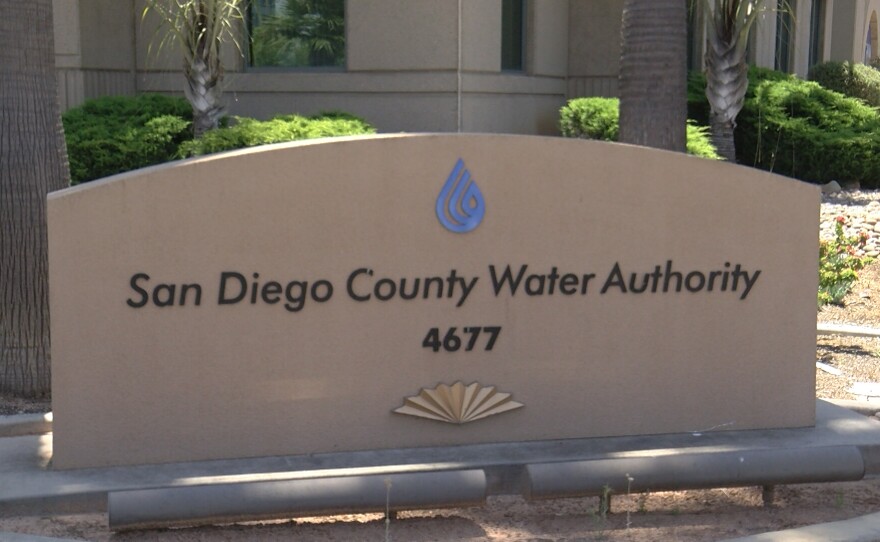The county Board of Supervisors voted 3-1 Tuesday to support state legislation that would require a vote by all customers served by water districts within the County Water Authority before individual districts can leave the authority.
Proposed by Supervisor Joel Anderson in a board letter, the policy follows a July 10 decision from the San Diego Local Agency Formation Commission to allow the Rainbow Municipal Water District and Fallbrook Public Utility District to leave the water authority.
With a goal of finding lower water costs for farmers, both districts want to join the Eastern Municipal Water District in Riverside. No timetable for the districts' departure was set.
On Aug. 21, the Water Authority filed a lawsuit over the proposed departure of the two water districts, alleging it will raise water rates for other county residents. The Water Authority contends the departures will shift around $140 million in costs that would have been paid by the Rainbow and Fallbrook agencies to the rest of the county's service area.
According to Anderson's board letter, the proposed state legislation "would require that, in addition to affirmative votes by customers in the water districts attempting to leave the CWA, an affirmative vote by a majority of all customers in the CWA service area would be required before proposed detachments become final."
Before the vote, Anderson said a recent study showed the costs of Fallbrook and Rainbow water districts leaving would be passed onto other districts.
"If you're gonna raise my water rates, I should have a right to vote on it," Anderson said during Tuesday's meeting.
Board Chairwoman Nora Vargas and Vice Chair Terra Lawson-Remer agreed with Anderson.
"If we allowed Fallbrook and Rainbow to defect, it would harm our entire region," Lawson-Remer said in a statement after the vote.
Supervisor Jim Desmond was the lone no vote and a strong critic of the proposal.
"I think it sets a very, very bad precedent for local control," he said. "This is terrible."
Anderson and Desmond are San Diego LAFCO members. Anderson opposed both water districts leaving the authority, while Desmond supported it.
Desmond said that as the San Diego LAFCO chairman, his vote for detachment was driven by the Water Authority's own municipal code on how a district may leave, via giving formal notice and vote of its own rate payers.
"That's it," Desmond said. "Period."
Desmond added that the Water Authority policy on district departures has been for the same for 50 years, and officials "could have changed their administrative code" if they felt it necessary.
Most of those speaking during a public hearing, including farmers, were in favor of the Fallbrook and Rainbow districts leaving the Water Authority.
Although Anderson's board letter does not specify any state legislation, speakers brought up Assembly Bill 399, sponsored by Assemblywoman Tasha Boener, a Democrat representing the 77th District.
That bill, called the Water Ratepayers Protections Act of 2023, would require a majority vote for agency withdrawal from a county water authority.
Stephani Baxter, of the Fallbrook Community Planning Group, said she was disappointed in Anderson, in part because he was not listening to his conservative constituents.
"You didn't get your way at LAFCO, and this is your workaround," she said.
Baxter told supervisors that if they voted in favor of Anderson's proposal, it will "show you trust you trust Sacramento over your constituents, and we'll see your true colors."
Robert Jackson of the California Avocado Commission said the Fallbrook and Rainbow districts must pay a $24 million exit fee, which was appropriate. He asked the board to not interfere with LAFCO decision, which was "not to be taken lightly."
"We're not asking for enrichment by separation," Jackson said. "Indeed, this is a matter of survival for the avocado growers in north San Diego County."
A woman who called in said that Fallbrook has "been overpaying for water for way too long," and "if everyone else's bill in San Diego County has to go up by one dollar, so be it."
Several governmental and industry representatives spoke in favor of Anderson's proposal, including Encinitas Mayor Tony Kranz, who said the two districts' departure would have a significant effects on rate payers of San Dieguito Water District.
He added that if the detachment proposal is fair, then voters will pass it.
Carol Kim, of the San Diego Building and Trades Construction Council, also brought up the fairness issue.
"As a society we agreed to collectively work together to make sure we all do better," said Kim, who thanked the county for having the foresight to plan on future water needs.







